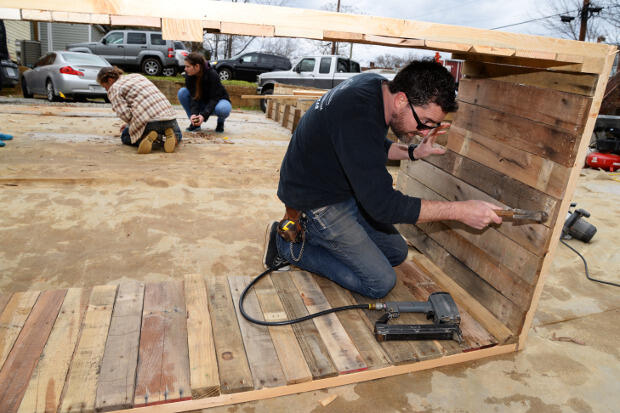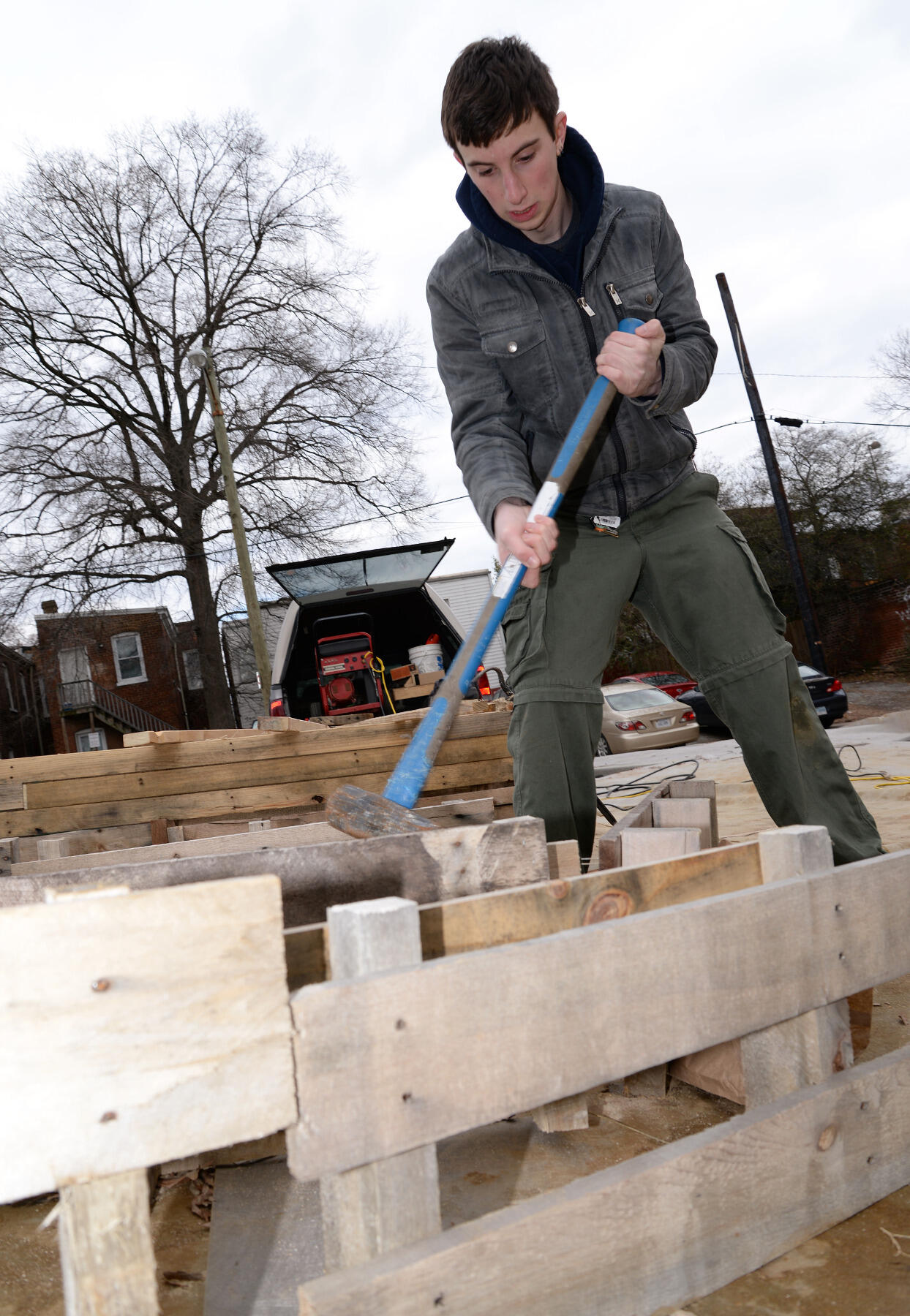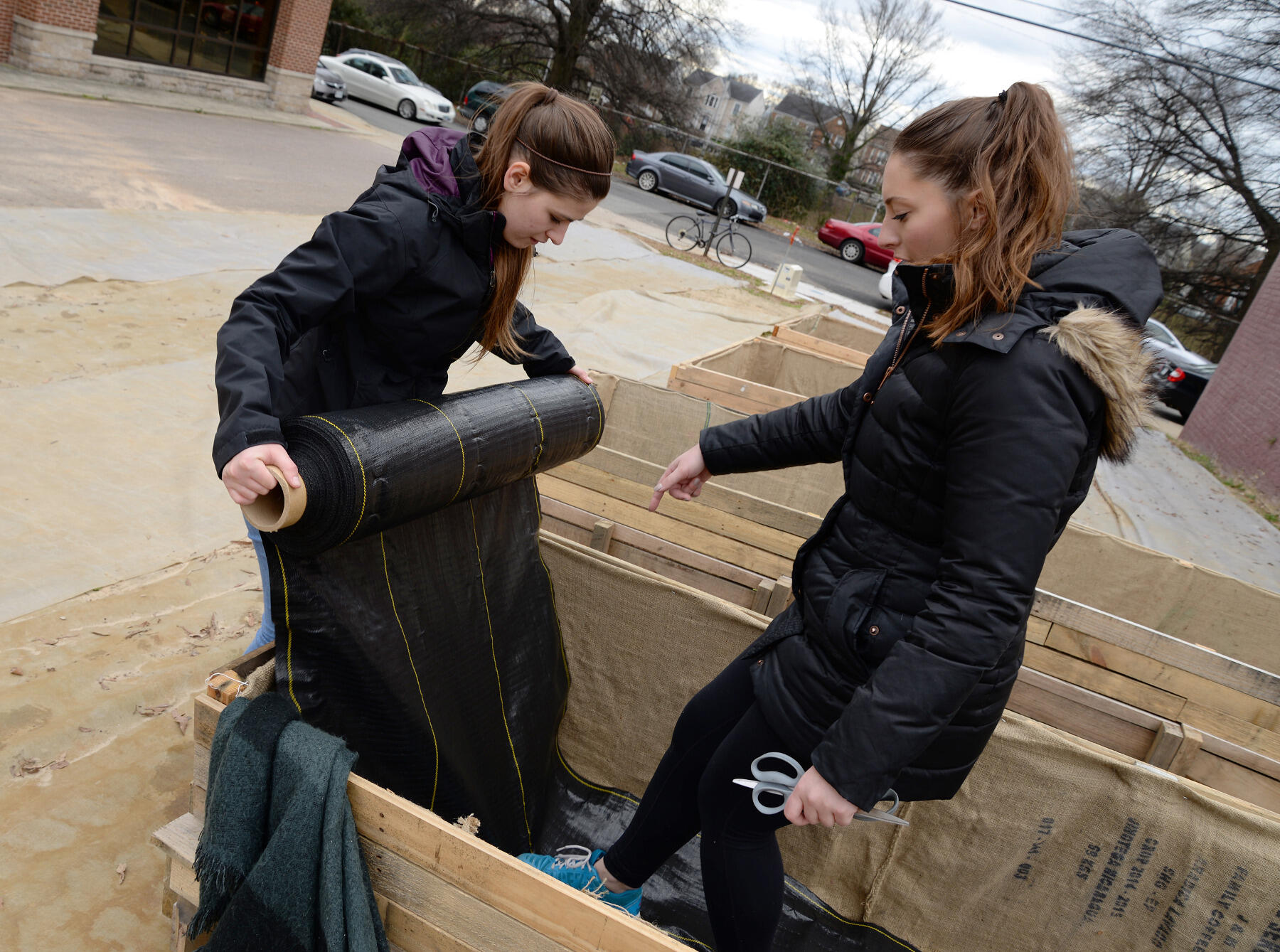
<br>Photos by Pat Kane, University Public Affairs
March 29, 2016
From pallets to garden beds: Building the Monroe Park Campus Learning Garden
Share this story
This isn’t a quiet afternoon at the garden.
Generators, reciprocating saws, air compressors and circular saws roar and whirr as raised garden beds take shape for the new Monroe Park Campus Learning Garden at Virginia Commonwealth University. Dedicated to growing food for the RamPantry and Center for High Blood Pressure, the new learning garden has come a long way since receiving a Council for Community Engagement Grant last summer.
Perhaps the most-visible step forward at the Parkwood Avenue site is the construction of raised beds with the expert help of Dinkus Deane, director of operations for the VCU School of the Arts.
Deane wields a circular saw to cut down a string of two-by-fours, while nearby volunteers slice off nail heads from broken-down pallets.
“Everything here came from renovations around the school’s Monroe Park Campus, or old pallets that were left lying around on loading docks at VCU. Essentially all the materials were trash that we’ve chopped up and pulled together,” he said.
With a few more nails punched in, Deane flips the bed and cuts down the opposite side. The saw spins and puffs a cloud of wood dust as he grabs the scraps and tosses them aside.
“It’s kind of a game for me to see how much we can get done without spending any money,” he said.
He’s an artist too, so he has the aesthetics of the garden in mind.
Deane and several volunteers carry the bed a few yards, where it has since been lined with burlap and filled with soil.
“Dinkus has been critical in every way with building this garden. He salvaged most of this wood on his own time, and his expertise in building has been invaluable,” said Hannah Wittwer, Learning Gardens coordinator for the Office of Sustainability.
“He’s an artist too, so he has the aesthetics of the garden in mind,” she said.
This season, the garden will focus on high-yield, familiar produce for use by the students, faculty and staff who make use of the RamPantry, as well as patients at the Center for High Blood Pressure.
The beds filling the townhouse-size plot – given to the Office of Sustainability by Parking and Transportation – should offer up a much larger harvest than previous years. Before, a single garden bed in the MCV Campus Learning Garden was used to grow donation crops. It yielded 150 pounds last year, and a few greens that overwintered were given to the RamPantry in January.
The rest of the MCV Campus Learning Garden beds are rented by community members.
So far, Wittwer and her volunteers have started seeds and directly planted a few crops, even as the Monroe Park Campus Learning Garden continues to take shape.
They used a spring break workday to plant spring onions, some of which have punched green leaves toward the sky. They will use staggered plantings to keep the crops rolling.

Wittwer decided to use raised beds for several reasons.
“Especially since this is an older city, I was concerned about heavy metal contamination. Nothing’s ever been grown here before, and I suspected the quality of the soil wasn’t going to be very good, so I like using raised beds for that reason,” she said.
Testing proved that metal contamination was not severe, but the soil was indeed poor. Dozens of cubic yards of fresh soil from YardWorks solved that problem. Near the wooden beds, you’ll find more than a dozen burlap coffee bags forming a walkway. They will hold potato and strawberry plants this spring.
Wittwer said gardening in beds will also support the garden’s future use as a community outreach space.
“As far as serving as an example for other people, a lot of people in an urban environment are going to be able to used raised beds more than they are going to be able to dig into their yard – especially if they are renting. You may not be able to dig a big garden in your yard, but you can do things in containers and beds,” she said.
Deane credits the rehabilitation of the former Richmond Glass Company building into The Depot for highlighting the value in materials that were only a step from the garbage can.

“As they were doing the demo, we were taking the wood, milling it and building all the furniture for the building. We were saving a heck of a lot of money on our furniture and equipment budget by doing our own furniture,” he said.
Joseph Seipel, dean of the VCU School of the Arts, said Deane’s creativity earned him bachelor’s and master’s degrees from VCU, and he has customized many projects across campus.
“He's an incredible, generous person and he doesn't say no very often,” Seipel said. “In his efforts to reclaim materials and find inventive and creative ways, he’s saved us a great deal of money and has done some great things for ecology.”
The pallets for the garden only took a half-hour to gather from campus loading docks.
“I don’t know how many people sit back and contemplate the amount of materials that get wasted,” Deane said. “The materials are everywhere if you start looking.”
The materials are everywhere if you start looking.
Subscribe for free to the weekly VCU News email newsletter at http://newsletter.news.vcu.edu/ and receive a selection of stories, videos, photos, news clips and event listings in your inbox every Thursday.
Subscribe to VCU News
Subscribe to VCU News at newsletter.vcu.edu and receive a selection of stories, videos, photos, news clips and event listings in your inbox.













